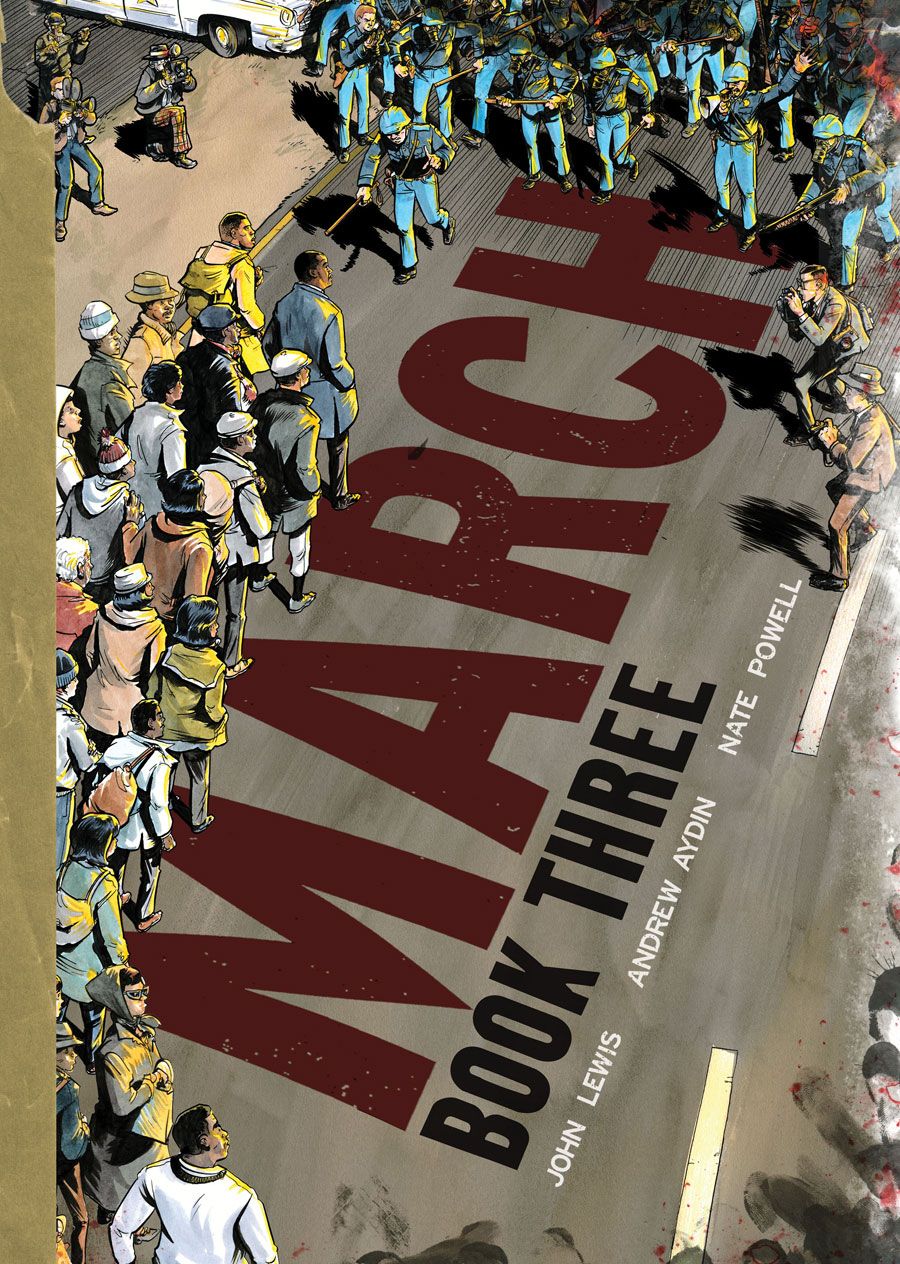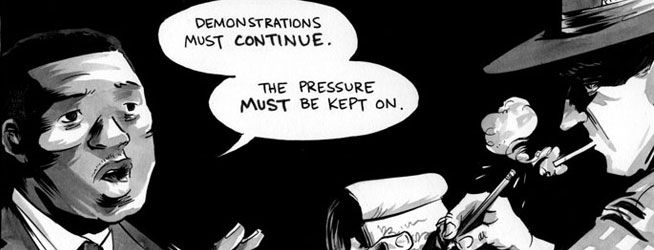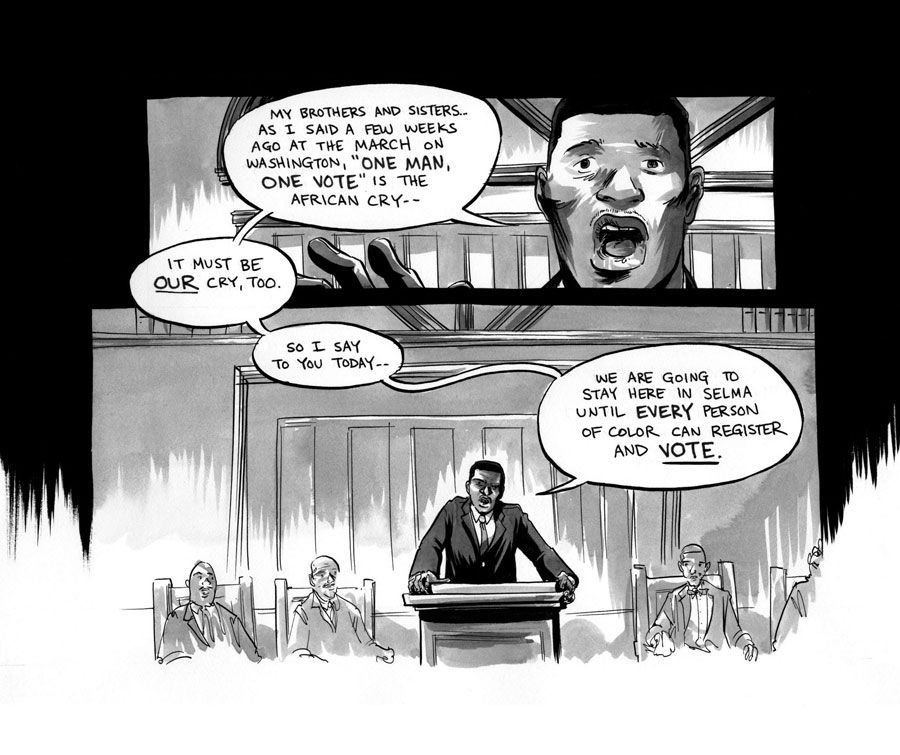Years' worth of hard work and effort yields a powerful and satisfying payoff in Congressman John Lewis, Andrew Aydin and Nate Powell's "March: Book Three," both in the literary and social sense. This third and final volume continues the story of Congressman Lewis' historic involvement in the Civil Rights Movement, culminating with his iconic march in Selma, Alabama over a half-century ago -- a moment widely seen as a turning point in 20th Century American history.
Congressman Lewis' story is legendary enough to have made it into the history books, but -- as chronicled by Powell and Aydin (who's also a director and advisor on the Congressman's staff) -- it becomes outright captivating and poignant. These passionate storytellers not only understand his message, but are able to convey that message to readers and instill its importance.
Following the progression of real-life events, "March: Book Three" captures the evolution of Congressman Lewis' efforts, which grew from small sit-ins to much larger -- but still non-violent -- outdoor protests that were met with violence more often than not. The Civil Rights Movement's objective remains unchanged, but the stakes are raised as its scale enlarges, something that both Aydin and Powell capture emotionally -- and sometimes brutally.
RELATED: "March" Co-Writer Hopes John Lewis' Story Instills a Sense of Power In Young Readers
Throughout this volume as well as the entire series, Congressman Lewis passionately and convincingly stresses the importance of causing the "right" kind of unrest in the name of social justice. As he explained at his "March" panel at this year's Comic-Con International in San Diego, "At fifteen years old, I heard the words of Rosa Parks and Martin Luther King Jr., and I was inspired to get in trouble; to get in the way. And ever since then, I've been getting in good trouble; in necessary trouble. 'March' is meant to inspire another generation of young people and get in good trouble; in necessary trouble." In "March: Book Three," his actions speak even louder than these words, and the volume proves the effectiveness of his methods.
Aydin deliberately and often excruciatingly focuses on the specific, detailed minutiae of the challenges faced by Congressman Lewis and others. For example, the tribulations of countless citizens -- who had to wait for hours or even days in blistering heat in an attempt register to vote while the government office and police sabotaged their efforts -- is painful in its length, pacing and detail, but it all combines to work all-too-well in communicating such pervasive discriminatory practices. Powell's dark and simple imagery, like the torso of a citizen deputized as a policeman who brandishes a machine gun, expresses the often dire circumstances with threatening clarity.
The increasing tension Congressman Lewis faced is also superbly presented; this includes not only the white establishment trying to thwart him, but also fellow -- and sometimes competitive -- organizers such as Malcolm X and even Dr. Martin Luthor King, whose goals didn't always fully align with his own, despite the fact they ultimately sought the same freedoms. There is also conflict within the organization that he himself presides over, and Aydin captures this internal friction with the same kind of tension, as in the scene where the activists face down armed law enforcement. No one could ever rightfully question Congressman Lewis' conviction, but Aydin's skill at laying out the simultaneous external and internal conflicts he faced serves to strengthen his legacy even further.
Powell's art is appropriately dark and often has a dirty, even ugly appearance. Far from being unattractive, though, it exemplifies this dark side of humanity as well as a social convention that once was considered acceptable. Even beaten and bloodied, these freedom fighters shine with nobility in Powell's renderings. In some captions, his lettering is small and nearly unreadable, which reflects their relative lack of importance in the social hierarchy, while the exaggerated size of others communicates the condescending bluster of those in power.
"March: Book Three" is more than just a wonderfully executed historical account and terrific educational volume; it's a victory tale for the oppressed, an inspiration to anyone victimized by injustice and a positive and motivational work that sings the praises and virtue of non-violence. As Aydin himself (who's the son of a Muslim immigrant and recently grew a full beard to acknowledge his heritage) said at Comic-Con's "March" panel, "I want my colleagues on Capitol Hill to know that I grew a beard because of their bigotry; because of what they're doing to our society. Non-violence isn't just a tool or a tactic; it's a way for all of us to live our lives. I think 'March' is a non-violent act." Together, Congressman Lewis, Aydin and Powell himself turn that into fact with "March: Book Three."



